Motor neurone disease is a term that encompasses a variety of specific diseases affecting the motor nerves. Motor neurone disease is a progressive, eventually fatal condition where the motor neurones stop functioning.
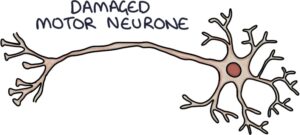
There is no effect on the sensory neurones. Sensory symptoms suggest an alternate diagnosis.
Amyotrophic lateral sclerosis (ALS) is the most common and well-known type of motor neurone disease. Stephen Hawking had amyotrophic lateral sclerosis.
Progressive bulbar palsy is the second most common form of motor neurone disease. It primarily affects the muscles of talking and swallowing (the bulbar muscles).
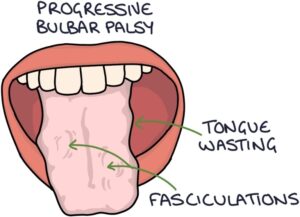
Other types to be aware of are progressive muscular atrophy and primary lateral sclerosis.
Pathophysiology
Motor neurone disease involves a progressive degeneration of both the upper and lower motor neurones. The sensory neurones are spared.
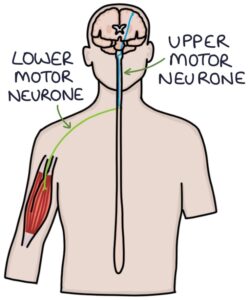
The exact cause is unclear, although several mechanisms have been considered. Many genes have been linked with an increased risk of developing the condition. Family history is important as around 5-10% of cases are inherited. There seems to be an increased risk with smoking and exposure to heavy metals and certain pesticides.
Presentation
The typical patient is a late middle-aged (e.g., 60) man, possibly with an affected relative. There is an insidious, progressive weakness of the muscles throughout the body, affecting the limbs, trunk, face and speech. The weakness is often first noticed in the upper limbs. There may be increased fatigue when exercising. They may complain of clumsiness, dropping things more often or tripping over. They can develop slurred speech (dysarthria).
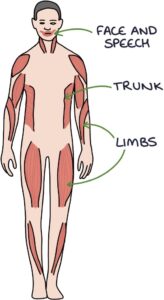
Signs of lower motor neurone disease:
- Muscle wasting
- Reduced tone
- Fasciculations (twitches in the muscles)
- Reduced reflexes
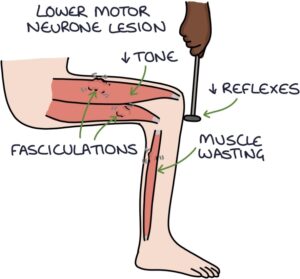
Signs of upper motor neurone disease:
- Increased tone or spasticity
- Brisk reflexes
- Upgoing plantar reflex
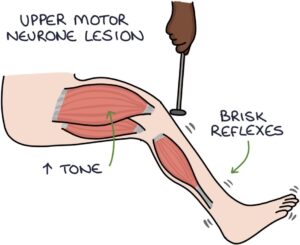
Diagnosis
The diagnosis needs to be made very carefully. It is based on the clinical presentation after excluding other conditions. It should only be made by a specialist when there is certainty. The diagnosis is often delayed, causing stress.
Management
There are no effective treatments for halting or reversing the progression of the disease.
Riluzole can slow the progression of the disease and extend survival by several months in ALS.
Non-invasive ventilation (NIV) can be used to support breathing when the respiratory muscles weaken.
Management of the condition involves supporting the person and their family:
- Breaking bad news effectively and supportively
- Multidisciplinary team (MDT) input to support and maintain their quality of life
- Symptom control (e.g., baclofen for muscle spasticity and antimuscarinic medical for excessive saliva)
- Benzodiazepines may help breathlessness worsened by anxiety
- Advanced directives to document their wishes as the disease progresses
- End-of-life care
Patients with motor neurone disease tend to die of respiratory failure or pneumonia.
Last updated September 2023
Now, head over to members.zerotofinals.com and test your knowledge of this content. Testing yourself helps identify what you missed and strengthens your understanding and retention.

